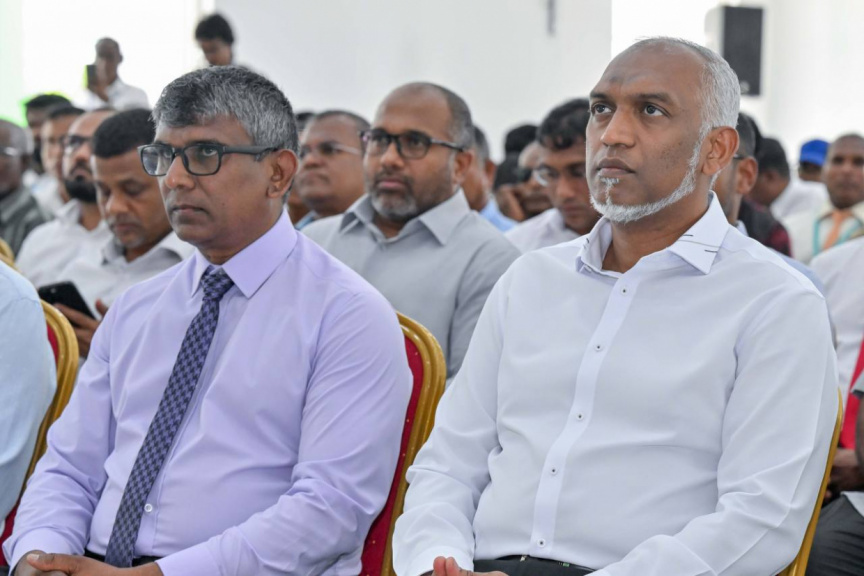
Independently-elected Thulhaadhoo MP Abdul Hannan Aboobakr (L) with President Dr. Mohamed Muizzu (R): Hannan says the media bill proposed by him, which has recieved the government's backing, will futher empower the media. (Photo/President's Office)
Independently-elected Thulhaadhoo MP Abdul Hannan Aboobakr who submitted the media bill which would grant the government and media regulatory body significant control over the media, claims that the bill would, on the contrary, empower the media.
Hannan, who maintains close ties with the government, previously put forth a similar bill envisaging significant control over the media. However, the bill was withdrawn after strong opposition from journalists and organizations.

In a message to the media regarding the bill, Hannan said the bill was submitted with the intent of empowering local media.
He underscored that Maldives Broadcasting Commission (BroadCom) presently comprises of members nominated by the president and approved by the Parliament. On contrary, he said the majority of the members elected to the media regulatory body formed under his bill would comprise of individuals elected by the media itself.
In this regard, he added that four out of the seven members of the commission would be elected by the media.
Hannan highlighted that the bill grants complete power and privileges to the media. He asserted that it creates an opportunity for the media to operate responsibly as the fourth pillar of the state and to deliver accurate reporting.
He added that the bill addresses a key issue: both the Maldives Media Council (MMC) and BroadCom which have been labeled as costly institutions with limited authority. According to him, the bill would reduce state spending on media regulation by establishing an authority that is empowered and respected.
Hannan has called on lawmakers from the government, opposition, and independents alike to back the bill.
Government endorses the bill
Notably, the government has endorsed the contentious bill.
The government’s chief spokesperson Heena Waleed said the administration would not have endorsed the bill if it weakens the media and obstructs the development of the field. She added that the government hopes to shape the bill with input of individuals working the media during the floor and committee stages.
Heena underscored several provisions in the bill, which is intended to bring out positive outcomes.

In this regard, she reiterated Hannan’s argument that four out of the seven members of the commission established to regulate the media would be elected by the media. She further underscored that the bill includes a provision on establishing a special four-member committee to review cases related content published by the media.
Heena said the concept of a single body to regulate the media as stipulated in the bill would provide significant easements. Notably, there are two regulatory bodies for the media at present: MMC and BroadCom.
She added that the bill also includes provisions to empower the media and further develop the sector.
Hannan’s Maldivian Media and Broadcasting Regulation Bill, seeks to establish the Maldivian Media and Broadcasting Commission as the single media regulatory body.
The bill also outlines stringent measures against media workers and journalists. News agencies failing to rectify issues as advised by the commission within a given timeframe face fines ranging from MVR 5,000 to MVR 25,000. Media outlets or newspapers violating the law could incur fines up to MVR 100,000.
Crucially, the Commission would have the authority to temporarily suspend a media outlet's registration during an investigation. This temporary cancellation could become permanent following a case taken to court. The commission also gains the power to block newspaper websites or halt television broadcasts.
Under the bill, the commission would be empowered to investigate any submitted case, even those that occurred up to a year before the commission's establishment or the bill's adoption.
The opposition has strongly rejected the bill.
In this regard, MDP’s chairperson Fayyaz Ismail, on Tuesday, said the bill is aimed at suppressing press freedom.